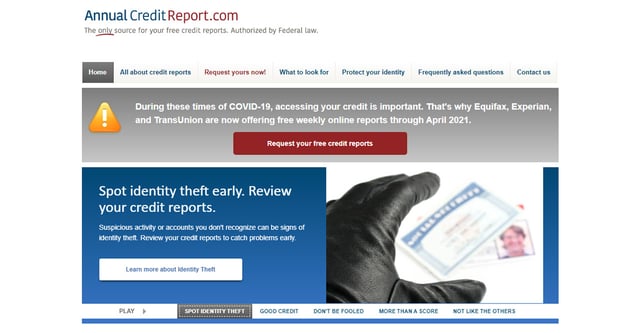The three most recognized credit reporting agencies or credit bureaus in the United States are Experian, TransUnion, and Equifax. Each of these companies maintains credit report information on over 200 million Americans.
The amount of information these companies collectively house is staggering, and, as such, errors can occur.
In fact, according to a 2013 credit file accuracy study performed by the Federal Trade Commission, the most recent study of its type, 1 in 5 people have errors on at least one of their credit reports. That reveals how important it is for you to understand how to contact the credit bureaus.
Reasons to Contact the Bureaus
Most consumers typically have three reasons why they would want or need to contact a credit bureau. The first would be to get a copy of their credit reports, also formally referred to as the disclosure of a credit report.
The second would be to file disputes to have mistakes corrected or removed from a credit report.
The third reason would be to add either a fraud alert or a security freeze to a credit report, both of which are fraud prevention tools.
All three of these reasons for contacting the credit reporting agencies are free, so you can leave your credit card in your wallet because you’re not going to need it.
1. Credit Report Disclosure
Federal law entitles you to one free credit report every 12 months. However, because of the COVID-19 pandemic, the credit reporting agencies are allowing free weekly credit reports for consumers through at least April 2021.
To claim your weekly free credit reports, you can contact the credit reporting agencies through their joint website, www.AnnualCreditReport.com.

AnnualCreditReport.com is the only website authorized by federal law to provide free credit reports.
This website was mandated in 2003 thanks to an amendment to the Fair Credit Reporting Act called FACTA, which is the acronym for the Fair and Accurate Credit Transactions Act of 2003. In fact, this website is the one and only website mandated by law to provide free credit reports to consumers.
The credit reports you pull from this site are referred to as credit report disclosures because the site’s only purpose is to disclose copies of credit reports to consumers. The credit reports pulled from this website will contain a wealth of information about your credit-related relationships with lenders, your personal identifying information, and collection account and public records, if any apply to you.
You can also request free credit reports directly from each of the credit reporting agencies on their websites:
Your credit reports will include mortgages, auto loans, student loans, and, yes, your credit card accounts. In addition, these credit reports will include up to a 24-month history of balances and payments on your credit card accounts. This is called trended data, which is the chronology of how you’ve used credit cards over the last two years.
Keep in mind as you review your credit reports that the data is not in real time, meaning the balances are not your balances as of the date you pulled your credit reports. Most lenders, including credit card issuers, only report your information to the credit bureaus once every statement cycle period, which is monthly.
As a result, the information you see on your credit reports will be current, but only as of your most recent monthly statements.
2. Credit Report Disputes
The second reason you’d likely need to contact the credit reporting agencies would be to dispute information on your credit reports that you believe to be inaccurate.
In fact, it wouldn’t be uncommon for you to file credit report disputes after you’ve pulled copies of your credit reports from the www.AnnualCreditReport.com website or the other methods discussed above. That’s because, without knowing what’s on your credit reports, it’s hard to know whether the information is accurate.
If you want to dispute information on your credit reports, you have a variety of options for doing so, including online, via the USPS, or by phone.
Disputing Your Experian Credit Report
You can visit Experian’s online credit report dispute center if you would like to dispute information on your Experian credit report.
If you’d like to file a credit report dispute with Experian by mail, the address is:
Experian
P.O. Box 4500
Allen, TX 75013
If you’d like to file a credit report dispute with Experian by phone, you can contact them at (866) 200-6020.
Disputing Your Equifax Credit Report
You can visit Equifax’s online credit report dispute center if you would like to dispute information on your Equifax credit report.
If you’d like to file a credit report dispute with Equifax by mail, the address is:
Equifax Information Services, LLC
P.O. Box 740256
Atlanta, GA 30374
If you’d like to file a credit report dispute with Equifax by phone, you can contact them at (866) 349-5191 from 8 a.m. to midnight ET, seven days a week.
Disputing Your TransUnion Credit Report
You can visit TransUnion’s online credit report dispute center if you would like to dispute information on your TransUnion credit report.
If you’d like to file a credit report dispute with TransUnion by mail, the address is:
TransUnion Consumer Solutions
P.O. Box 2000
Chester, PA 19016
If you’d like to file a credit report dispute with Experian by phone, you can contact them at (800)-916-8800.
3. Fraud Alerts and Security Freezes
You have several options to protect your credit reports if you are concerned that your personal information has been stolen or if someone has applied for credit in your name.
You can add one of a variety of fraud alerts to your credit reports or you can remove your credit reports from circulation by adding a security freeze, which is also called a credit freeze. This is the last of the three customary reasons why someone would contact a credit bureau.
Adding Fraud Alerts
A fraud alert is a statement on your credit reports that notifies lenders or other users of credit reports that you may have been the victim of fraud and that they should verify the authenticity of any credit application submitted in your name.
Lenders are obligated to incorporate reasonable procedures to verify that the application is legitimate. This is generally done by the lender calling you at the phone number you’ve included in the fraud alert.
Fraud alerts vary in the amount of time they remain on your credit reports. An initial fraud alert will last for only one year and will need to be renewed by you if you’d like it to remain longer.
Extended Fraud Alerts will last for seven years, but you are required to complete an FTC Identity Theft Report verifying that you’ve been the victim of fraud. Active Duty fraud alerts, for members of the military, will also last for one year and will need to be renewed at the end of that period.
You only need to file a fraud alert with one of the credit bureaus:
- File an Experian Fraud Alert online or call 888-397-3742
- File an Equifax Fraud Alert online or call 800-685-1111
- File a TransUnion Fraud Alert online or call 888-909-8872
The credit bureau you file an alert with is then required to share your alert with the other two credit bureaus.
Adding A Security Freeze
A security freeze blocks access to your credit reports from all parties unless there is an existing relationship between you and the lender. Debt collectors can also access your credit reports to assist with their collection efforts even if your reports are frozen.
Security freezes prevent fraudulent accounts from being opened in your name because lenders can’t access your credit reports or scores without your permission. You control the access to your reports.
Unlike fraud alerts, you will need to contact each of the credit reporting agencies to place security freezes independently on all of your credit reports.
- Freeze Your Experian Credit Report
- Freeze Your Equifax Credit Report
- Freeze Your TransUnion Credit Report
When you place a security freeze on your credit reports, you will be assigned a personal identification number or PIN. You’ll need your PIN to lift the security freeze, which you’ll need to do when you legitimately apply for credit.
Security freezes were, at one time, only free for consumers who were verified victims of fraud. However, a recent amendment to the Fair Credit Reporting Act signed by President Trump made security freezes free for everyone, whether you’ve been the victim of fraud or not.
Check Your Credit Reports Every Year
In sum, the most common reasons to contact the credit bureaus is to request copies of your credit reports, file disputes as to the accuracy of the data contained in your credit reports, and ensure that your personal and credit report information is protected from fraud.
These processes are all rights that you enjoy thanks to the Fair Credit Reporting Act, which is why consumers can get copies of their reports from each bureau free of charge.
Advertiser Disclosure
CardRates.com is a free online resource that offers valuable content and comparison services to users. To keep this resource 100% free, we receive compensation for referrals for many of the offers listed on the site. Along with key review factors, this compensation may impact how and where products appear across CardRates.com (including, for example, the order in which they appear). CardRates.com does not include the entire universe of available offers. Editorial opinions expressed on the site are strictly our own and are not provided, endorsed, or approved by advertisers.











